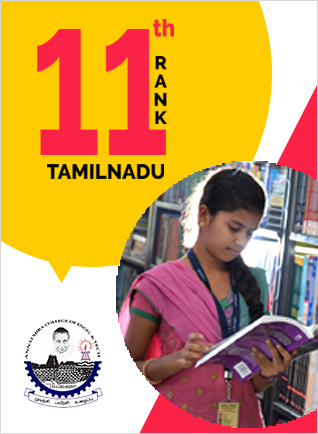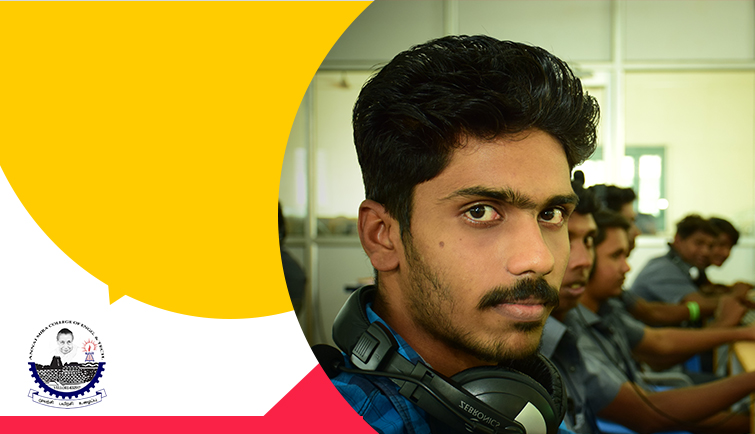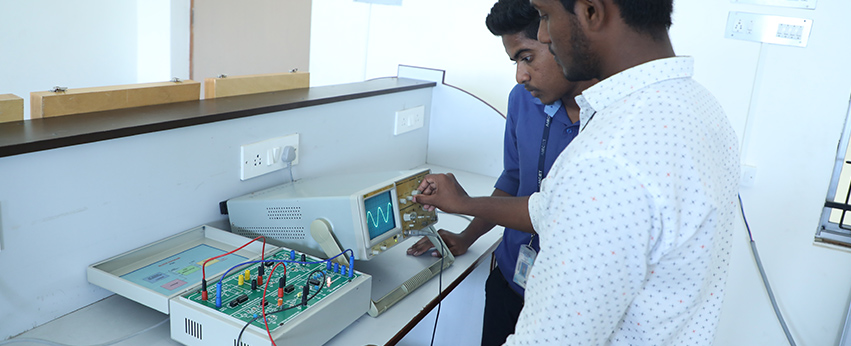- Email: [email protected]
- Mobile: 94433 04963
- Online Grievances
- Careers
- Contact Us
- Follow Us:
Admissions Hotline - 99523 87017
About Department
The Department of Electronics and Communication Engineeering was established in the academic year 2012-13, with a dedication to giving pupils a top-notch education and encouraging self-discipline. Electronics and Communication Engineering (ECE), is a popular branch of engineering, which focuses on the design, development, and testing of electronic equipment and communication systems, including devices like transmitters, receivers, and integrated circuits. This field also encompasses areas such as digital and analog transmission, signal processing, and more. Transmitters, receivers, integrated circuits (IC), and other electronic devices and circuits are all part of the field of electronics and communication engineering. Additionally, it covers fundamental electronics, satellite communication, microwave engineering, antennae, wave evolution, microprocessors, analog and digital data transmission and reception, voice and video (such as AM, FM, and DTH), and more.
In order to prepare students for their professional work involving analysis, systems implementation, operation, production, and maintenance of the various applications in the field of Electronics and Communications Engineering, our faculty members play a very crucial role to deepen the students' understanding of fundamental concepts and theories. Our curriculum is designed to meet the needs with the evolving needs of the industry and corporate sectors, ensuring that students are well-prepared for the challenges of the modern workforce. The department encourages robust interaction between staff and students, fostering a dynamic learning environment. All laboratories are equipped with advanced facilities, meeting the requirements of the curriculum to facilitate hands-on learning. The department boasts a team of highly qualified and experienced faculty members, many of whom actively contribute to research in their respective fields. Their research endeavours are frequently published in prestigious national and international journals.
Vision
Our vision is to foster an energetic learning environment that nurtures creativity and critical thinking, acting as a driving force for technological advancements addressing global challenges such as sustainable energy and transformative digital innovations.
Mission
- We are committed to providing an empowering education that equips students with the essential knowledge, skills, and ethical principles to cultivate a dynamic research community.
- Within this community, faculty and students collaborate on interdisciplinary projects, innovating new technologies and solutions to address real-world challenges.
PROGRAM EDUCATIONAL OBJECTIVES (PEOs)
- PEO-01:To provide the students with a strong foundation in the required sciences in order to pursue studies in Electronics and Communication Engineering.
- PEO-02:To gain adequate knowledge to become good professional in electronic and communication engineering associated industries, higher education and research.
- PEO-03:To develop attitude in lifelong learning, applying and adapting new ideas and technologies as their field evolves.
- PEO-04:To prepare students to critically analyze existing literature in an area of specialization and ethically develop innovative and research oriented methodologies to solve the problems identified.
- PEO-05:To inculcate in the students a professional and ethical attitude and an ability to visualize the engineering issues in a broader social context
PROGRAM OUTCOMES (POs)
PO GRADUATE ATTRIBUTE
- PO-01:Engineering knowledge: Apply the knowledge of mathematics, science, engineering fundamentals, and an engineering specialization to the solution of complex engineering problems.
- PO-02:Problem analysis: Identify, formulate, review research literature, and analyse complex engineering problems reaching substantiated conclusions using first principles of mathematics, natural sciences, and engineering sciences.
- PO-03:Design/development of solutions: Design solutions for complex engineering problems and design system components or processes that meet the specified needs with appropriate consideration for the public health and safety, and the cultural, societal, and environmental considerations.
- PO-04:Conduct investigations of complex problems: Use research-based knowledge and research methods including design of experiments, analysis and interpretation of data, and synthesis of the information to provide valid conclusions.
- PO-05:Modern tool usage: Create, select, and apply appropriate techniques, resources, and modern engineering and IT tools including prediction and modelling to complex engineering activities with an understanding of the limitations.
- PO-06:The engineer and society: Apply reasoning informed by the contextual knowledge to assess societal, health, safety, legal and cultural issues and the consequent responsibilities relevant to the professional engineering practice
- PO-07:Environment and sustainability: Understand the impact of the professional engineering solutions in societal and environmental contexts, and demonstrate the knowledge of, and need for sustainable development.
- PO-08:Ethics: Apply ethical principles and commit to professional ethics and responsibilities and norms of the engineering practice.
- PO-09:Individual and team work: Function effectively as an individual, and as a member or leader in diverse teams, and in multidisciplinary settings.
- PO-10:Communication: Communicate effectively on complex engineering activities with the engineering community and with society at large, such as, being able to comprehend and write effective reports and design documentation, make effective presentations, and give and receive clear instructions.
- PO-11:Project management and finance: Demonstrate knowledge and understanding of the engineering and management principles and apply these to one’s own work, as a member and leader in a team, to manage projects and in multidisciplinary environments.
- PO-12:Life-long learning: Recognize the need for, and have the preparation and ability to engage in independent and life-long learning in the broadest context of technological change.
PROGRAM SPECIFIC OUTCOMES (PSOs)
- PSO-01:Design, develop and analyze electronic systems through application of relevant electronics, mathematics and engineering principles
- PSO-02:Design, develop and analyze communication systems through application of fundamentals from communication principles, signal processing, and RF System Design & Electromagnetics.
- PSO-03:Adapt to emerging electronics and communication technologies and develop innovative solutions for existing and newer problems.
B.E Electronics and Communication Engineering Admission Process
The admission process for B.E Electronics and Communication Engineering is based on the marks obtained in the higher secondary exam.
- Students after qualifying their 10+2 exam from the maths stream with a minimum of 40% of marks are eligible to apply for admission in this course.
- On the basis of these eligibility criteria, students are granted admission to this course.





